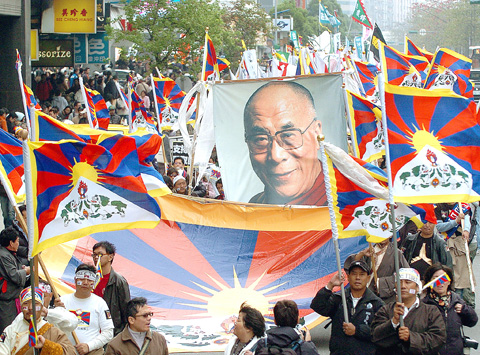Thousands of people marched in the streets of Taipei yesterday to commemorate the 50th anniversary of the 1959 Tibetan Uprising and show their support for Tibetans’ struggle for freedom.
“We Tibetans have been in exile for 50 years. The Chinese government tries hard to make us forget who we are — but we will not,” Regional Tibetan Youth Congress Taiwan chairman Tashi Tsering told the crowd before the march began.
“I was born in exile, but I never forget who I am, what my country is, and we all firmly believe that Tibet will become independent again,” Tashi said, as the crowd answered with a resounding “Free Tibet!”

PHOTO: FANG PIN-CHAO, TAIPEI TIMES
Nine years after China invaded Tibet in 1950, Tibetans launched an uprising during which the Tibetan political and religious leader, the Dalai Lama, went into exile in India, with tens of thousands of Tibetans following.
Tibetans continued to fight Chinese rule, resulting in more than 1.2 million deaths, Tibet support groups and the Tibetan government in exile have said.
The march started at the Zhongxiao Fuxing MRT station in Taipei and went through busy shopping districts.
Many shoppers joined in.
“Tibetans want to go home,” “China, get out of Tibet!” the demonstrators shouted as they marched, holding Tibetan flags, a large portrait of the Dalai Lama and various placards.
At 3:10pm, the procession stopped and observed a minute of silence for Tibetans killed in their struggle for freedom.
Several key figures from the Democratic Progressive Party took part in the rally.
Chinese democracy activist Cai Lujun (蔡陸軍) was also among the crowd.
“Opposing dictatorship and tyranny is a universal value that goes beyond nationalities or races,” Cai said. “Ignoring what’s going on in Tibet today is ignoring what will happen to Taiwan tomorrow.”
Aside from showing their usual support for Tibetans, many demonstrators this year voiced their worries about Taiwan’s future.
“We can see that freedom of speech and freedom of press are deteriorating in Taiwan, especially after Ma Ying-jeou [馬英九] took over as president [last year],” said Eric Chang (張浩明), a young demonstrator. “If we don’t stand up now, our fate could be the same as that of Tibetans.”
Weng Chih-ming, a 31-year-old technology company engineer, said he supported Tibet out of a sense of justice as a human being, adding that he didn’t want Taiwan to fall “under China’s dictatorship.”
An elementary school teacher surnamed Fu (傅) expressed similar concerns.
“I don’t want Taiwan to become like Tibet … I don’t want our next generation to live a hard life under Chinese rule,” Fu said.
Erinn Law, a Canadian who has been living in Taiwan for five years, echoed Chang’s view.
“Not enough people know about what’s going on [in Tibet], so we need to [speak up],” she said, clearly excited by the large crowd that had gathered for this year’s event.
“I don’t want what happened to Tibet to happen to Taiwan, because I love Taiwan,” she said.
ADDITIONAL REPORTING BY AP

AIR SUPPORT: The Ministry of National Defense thanked the US for the delivery, adding that it was an indicator of the White House’s commitment to the Taiwan Relations Act Deputy Minister of National Defense Po Horng-huei (柏鴻輝) and Representative to the US Alexander Yui on Friday attended a delivery ceremony for the first of Taiwan’s long-awaited 66 F-16C/D Block 70 jets at a Lockheed Martin Corp factory in Greenville, South Carolina. “We are so proud to be the global home of the F-16 and to support Taiwan’s air defense capabilities,” US Representative William Timmons wrote on X, alongside a photograph of Taiwanese and US officials at the event. The F-16C/D Block 70 jets Taiwan ordered have the same capabilities as aircraft that had been upgraded to F-16Vs. The batch of Lockheed Martin

GRIDLOCK: The National Fire Agency’s Special Search and Rescue team is on standby to travel to the countries to help out with the rescue effort A powerful earthquake rocked Myanmar and neighboring Thailand yesterday, killing at least three people in Bangkok and burying dozens when a high-rise building under construction collapsed. Footage shared on social media from Myanmar’s second-largest city showed widespread destruction, raising fears that many were trapped under the rubble or killed. The magnitude 7.7 earthquake, with an epicenter near Mandalay in Myanmar, struck at midday and was followed by a strong magnitude 6.4 aftershock. The extent of death, injury and destruction — especially in Myanmar, which is embroiled in a civil war and where information is tightly controlled at the best of times —

China's military today said it began joint army, navy and rocket force exercises around Taiwan to "serve as a stern warning and powerful deterrent against Taiwanese independence," calling President William Lai (賴清德) a "parasite." The exercises come after Lai called Beijing a "foreign hostile force" last month. More than 10 Chinese military ships approached close to Taiwan's 24 nautical mile (44.4km) contiguous zone this morning and Taiwan sent its own warships to respond, two senior Taiwanese officials said. Taiwan has not yet detected any live fire by the Chinese military so far, one of the officials said. The drills took place after US Secretary

THUGGISH BEHAVIOR: Encouraging people to report independence supporters is another intimidation tactic that threatens cross-strait peace, the state department said China setting up an online system for reporting “Taiwanese independence” advocates is an “irresponsible and reprehensible” act, a US government spokesperson said on Friday. “China’s call for private individuals to report on alleged ‘persecution or suppression’ by supposed ‘Taiwan independence henchmen and accomplices’ is irresponsible and reprehensible,” an unnamed US Department of State spokesperson told the Central News Agency in an e-mail. The move is part of Beijing’s “intimidation campaign” against Taiwan and its supporters, and is “threatening free speech around the world, destabilizing the Indo-Pacific region, and deliberately eroding the cross-strait status quo,” the spokesperson said. The Chinese Communist Party’s “threats